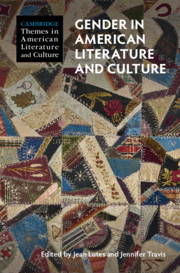Book contents
- Gender in American Literature and Culture
- Cambridge Themes in American Literature and Culture
- Gender in American Literature and Culture
- Copyright page
- Contents
- Contributors
- Acknowledgments
- Introduction
- Part I Intimacies
- Part II Aggressions
- Chapter 8 Sexual Violence and Indigenous Women
- Chapter 9 Intergenerational Memory and the Making of Indigenous Literary Kinships
- Chapter 10 US Women Writers, Sexual Violence, and Narrative Resistance
- Chapter 11 Gender, Violence, and Accountability in Contemporary Queer Latina Writing
- Chapter 12 The Literature of Racial Uplift and White Feminist Failure
- Chapter 13 Black Male Studies and Contemporary African American Writing
- Chapter 14 Representations of White Masculinity in Veteran-Authored Iraq War Fiction
- Part III New Directions
- Bibliography
- Index
Chapter 13 - Black Male Studies and Contemporary African American Writing
from Part II - Aggressions
Published online by Cambridge University Press: 01 April 2021
- Gender in American Literature and Culture
- Cambridge Themes in American Literature and Culture
- Gender in American Literature and Culture
- Copyright page
- Contents
- Contributors
- Acknowledgments
- Introduction
- Part I Intimacies
- Part II Aggressions
- Chapter 8 Sexual Violence and Indigenous Women
- Chapter 9 Intergenerational Memory and the Making of Indigenous Literary Kinships
- Chapter 10 US Women Writers, Sexual Violence, and Narrative Resistance
- Chapter 11 Gender, Violence, and Accountability in Contemporary Queer Latina Writing
- Chapter 12 The Literature of Racial Uplift and White Feminist Failure
- Chapter 13 Black Male Studies and Contemporary African American Writing
- Chapter 14 Representations of White Masculinity in Veteran-Authored Iraq War Fiction
- Part III New Directions
- Bibliography
- Index
Summary
The recent work of philosopher Tommy J. Curry in the nascent field of Black Male Studies has brought rigorous attention to racialized misandry, framing Black maleness as a site of racial-sexual victimhood, vulnerability, and violence. This essay deploys Curry’s framework of “the man-not” in order to examine how anti-Black misandry is explored in Ishmael Reed’s Reckless Eyeballing (1986) and Kiese Laymon’s Heavy: An American Memoir (2018). Reed and Laymon each thematize anti-Blackness in the contemporary period specifically through the ontology of anti-Black misandry. The essay outlines the possibilities of a counter-ontological surplus within the abjection of Black manhood, which Laymon describes as the “abundance” designated by Black maleness in an anti-Black world. The essay concludes with a discussion of how Black Male Studies may be understood within recent thought trends regarding Black sexuality and gender studies, as well as within the Ontological Turn in Black Studies.
Keywords
- Type
- Chapter
- Information
- Gender in American Literature and Culture , pp. 204 - 218Publisher: Cambridge University PressPrint publication year: 2021

